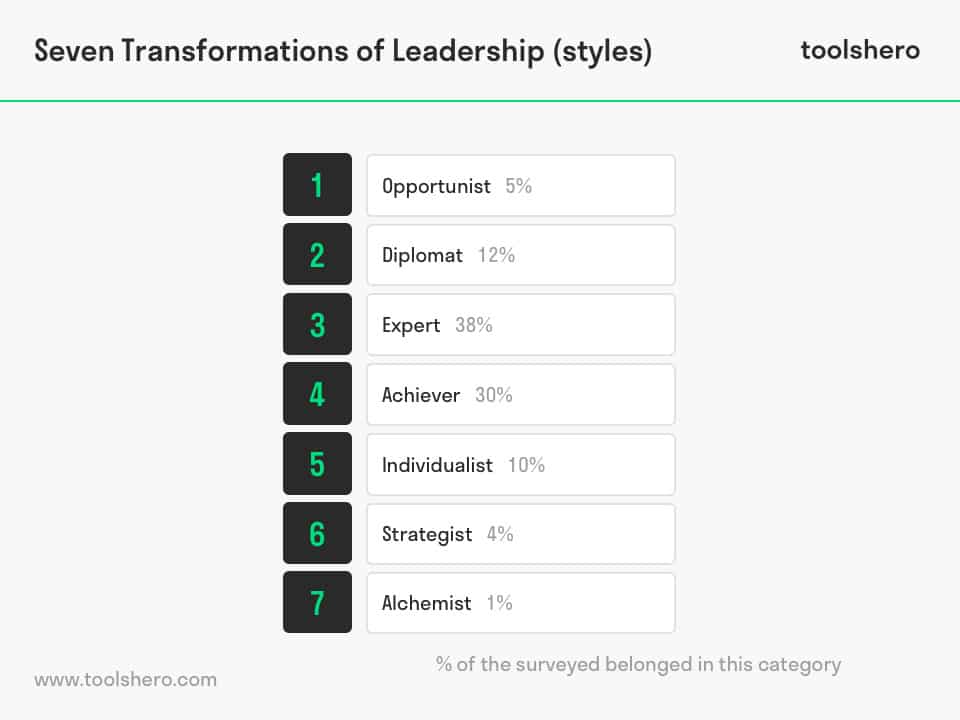Seven Transformations of Leadership

Seven Transformations of Leadership: this article describes the Seven Transformations of Leadership, developed by David Rooke and William R. Torbert in a practical way. After reading you will understand the definition and basics of this powerful leadership theory.
What are the Seven Transformations of Leadership?
David Rooke is an American leadership guru and co-founder of Harthill Consulting, which specialises in developing leadership within organisations. William R. Torbert is an American professor whose fields includes behaviour within organisations. In 2005, they wrote the book ‘Seven Transformations of Leadership’ together.
In it they don’t emphasise a particular leadership philosophy, but rather focus on the personality of leaders and their management style. They describe seven different leadership styles, namely Opportunists, Diplomats, Experts, Achievers, Individualists, Strategists, and Alchemists.
Seven Transformations of Leadership research
Rooke and Torbert conducted research among thousands of managers of over 100 American and European businesses. These included profit and non-profit organisations and government bodies.
In their study, they established that there are three types of leaders that are related to lower-than-average performance.
These are the Opportunists, Diplomats, and Experts that comprised 55% of the sample. This group was considerably less effective when it came to implementing organisational strategies than the 30% of the sample who were rated as Achievers.
15% of the managers in the sample showed the consistent ability to innovate and to successfully transform their organisation. These were the Individualists, Strategists, and Alchemists.
Rooke and Torbert’s Seven Transformations of Leadership research was based on a survey called ‘Leadership Development Profile’. This survey asked respondents to complete 36 sentences, leading to very diverse responses.
This sentence completion method enabled the evaluators to get an idea of how the respondents interpret their own actions and the world around them. From this information, it could then be concluded to which dominant style of thinking the respondent belonged.
Opportunist, Diplomat, Expert, Achiever, Individualist, Strategist, or Alchemist. More capable leaders will switch more between the different leadership styles. That’s why Rooke and Torbert recommend administering the test again after a few years.
Seven Transformations of Leadership : action logic
Rooke and Torbert mention action logic in their research. This is a critical aspect that is defined as how ‘leaders interpret their own behaviour and that of others, and how they safeguard or maintain power in the face of threats.’
They then conclude that the levels of company and individual performance vary based on this action logic. Each level goes one step further for leaders of organisations with more mature and productive action logic.
The key concept is that leaders can evaluate through these seven action logics. For example, this happens when a leader is exploring new interpersonal behaviour, engages in new work relationships, or expands work experiences.
Seven leadership styles
In order to understand in which categories and levels of business performance leaders belong, we’ll take a closer look at the seven leadership styles / the Seven Transformations of Leadership.
We’ll start with the least productive and least complex styles. The levels that a leader can reach start with the Opportunist at the lowest rung and the Alchemist at the top. Based on the ‘Leadership Development Profile’, it can be determined which of the seven types is dominant for the participant.
1. Opportunist
Someone with this leadership style has a single preferred style for winning, which can make them come across as manipulative. They tend to consider their behaviour legitimate.
As a result, they’re not open to feedback and can behave in vengeful ways; an eye for an eye. In most cases, Opportunists long to control the world around them. They treat others as competitors. Their strength lies in adequately responding to emergency situations, and they are able to quickly identify opportunities.
Rooke and Torbert found that about 5% of the surveyed belonged in this category.
2. Diplomat
Looking at the Seven Transformations of Leadership, someone with this leadership style prefers to avoid conflict. They focus on controlling their own behaviour and stick to group norms. The Diplomat tends to be loyal and acts in service of the group. That can turn out to be their downfall, since they try to make everyone their friend.
People around them can take advantage of that. The Diplomat achieves acceptance through cooperation. Diplomats are not suited for upper management; they don’t like to take unpopular decisions or get involved in conflicts. Initiating change is also hard for them, so they will avoid it. Their strength lies in bringing people together and responding to their needs.
Rooke and Torbert’s study had about 12% of the respondents in this category.
3. Expert
Someone with this leadership style is focused on logic and expertise and always looks for rational explanations and efficiency. They prefer to work alone and make great individual contributions. It’s the largest single category of leaders. The expert wants to back everything with water-tight arguments and facts.
Unsurprisingly, you can find many accountants, IT professionals, and tax experts in this category. They strive for continuous improvement, efficiency, and perfection. As a leader, they are demanding and sometimes stubborn; they tend to believe they are right. Collaboration is considered a waste of time by Experts, and they will treat someone with less expertise contemptuously. Emotional intelligence is not their forte.
The study showed that about 38% of the respondents belonged in this category.
4. Achiever
Someone with this leadership style focuses on strategic goals and converts those into effective goals for their team. With this leadership style of the Seven Transformations of Leadership, they are able to challenge and support employees and value a pleasant work environment.
That’s what lets their employees flourish. Yet the Achiever also has trouble thinking outside of the box or dealing with complex matters. They are open to feedback and try to resolve problems and/or conflicts in creative ways. Having a high level of emotional intelligence means that Achievers don’t always get along with Experts.
The study showed that about 30% of the respondents belonged in this category.
5. Individualist
A person with this leadership style can mainly be found in entrepreneurial or consultancy roles. Strategy and performance go hand in hand and the Individualist manages to resolve any issues with those effortlessly. The Individualist is able to contribute unique, practical values to the organisation.
They can put any behaviour and situation in the proper perspective. The Individualist is one of the few leadership styles that’s able to communicate with leaders in different roles. Potential conflicts are seen as a source of excitement and creativity; an opportunity to develop. Individualists regularly ignore rules they consider irrelevant.
The study showed that about 10% of the respondents belonged in this category.
6. Strategist
Within the Seven Transformations of Leadership, a person with this leadership style is able to generate organisational and personal transformations. They are vigilant and practice the power of mutual research. The Strategist can grasp different visions and bring them together. They do not shy away from conflicts or intense debates with people who hold different opinions. They can also handle it well when employees are faced with change.
The study showed that about 4% of the respondents belonged in this category.
7. Alchemist
Someone with this leadership style is able to generate social transformations. They also integrate material, spiritual, and social transformations, and can lead community-wide transformations. An Alchemist can reinvent both themselves and their organisation in remarkable ways.
They can deal with many situations on multiple levels. They are like a chameleon when navigating different socials strata and can talk to anyone. All while never losing sight of priorities and/or long-term objectives. They are charismatic and serve as an example to the people around them.
The study showed that about 1% of the respondents belonged in this category.
It’s Your Turn
What do you think? Recognize the above practical explanation or do you have any additions? What are your experiences with the Seven Transformations of Leadership?
Share your experience and knowledge in the comments box below.
More information
- O’Loughlin, D. (2011). The journey of personal and organization development with some maps for the trip. AU-GSB e-JOURNAL, 4(2).
- Rooke, D., & Torbert, W. R. (2009). Seven transformations of leadership. The Essential Guide to Leadership, 41.
- Torbert, W. R., & Livne-Tarandach, R. (2009). Reliability and Validity Tests of the Harthill Leadership Development Profile in the Context of Developmental Action Inquiry Theory, Practice and Method. Integral Review: A Transdisciplinary & Transcultural Journal for New Thought, Research, & Praxis, 5(2).
How to cite this article:
Mulder, P. (2019). Seven Transformations of Leadership. Retrieved [insert date] from Toolshero: https://www.toolshero.com/leadership/seven-transformations-of-leadership/
Original publication date: 12/13/2019 | Last update: 04/11/2024
Add a link to this page on your website:
<a href=”https://www.toolshero.com/leadership/seven-transformations-of-leadership/”>Toolshero: Seven Transformations of Leadership</a>













